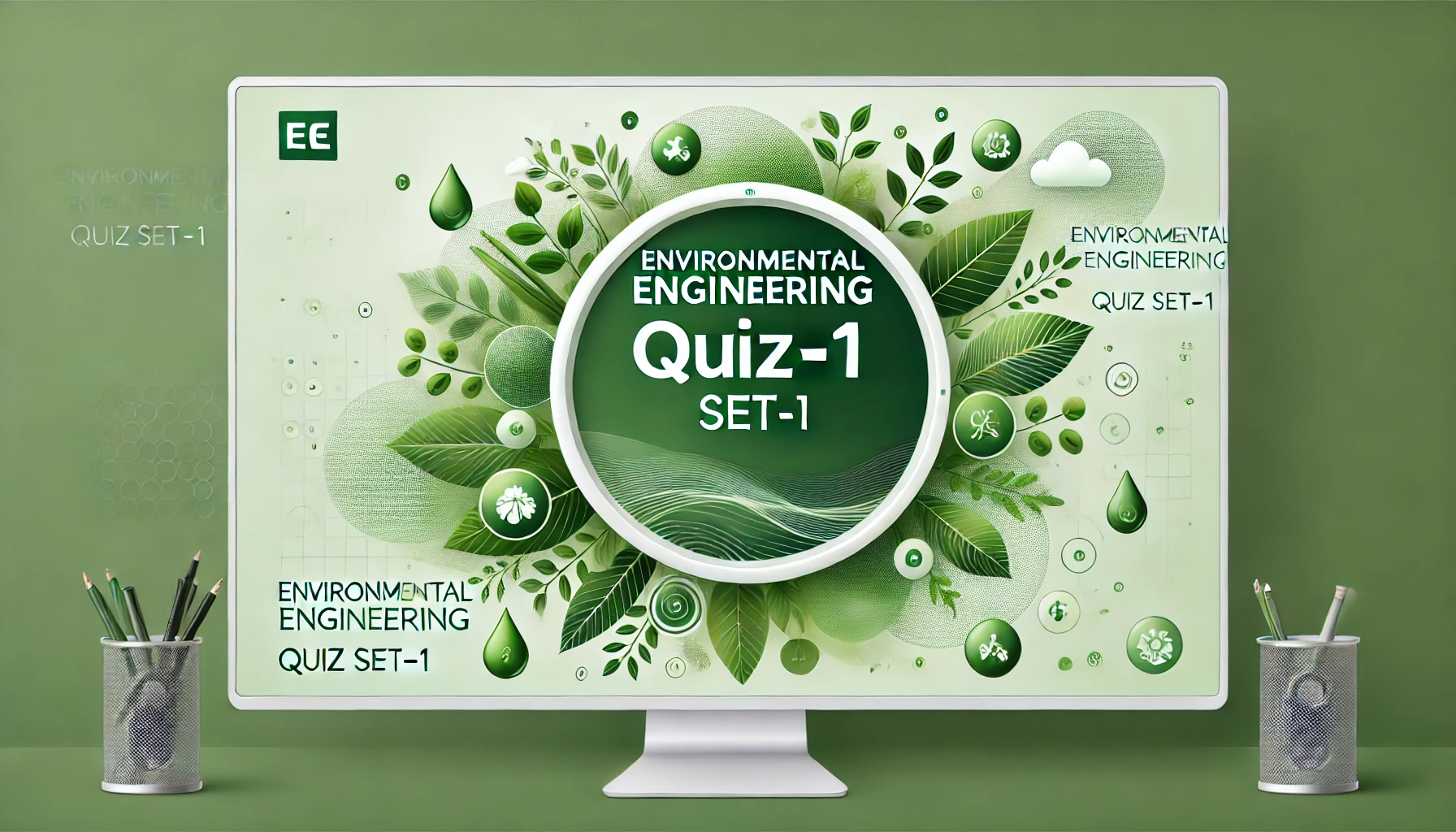Environmental Engineering Quiz Set-1 [2025]
Welcome to “Environmental Engineering Quiz Set-1 [2025]”! In this blog, we’ve curated 50+ engaging multiple-choice questions that delve into the fundamental and advanced concepts of environmental engineering. “Environmental Engineering Quiz Set-1 [2025]” is designed to help you reinforce your understanding, test your knowledge, and gain valuable insights into the principles and practices of environmental engineering. Whether you’re an environmental engineering student, a professional in the field, or preparing for competitive exams, this quiz is the ideal way to boost your expertise and stay ahead in your learning journey. Let’s dive into the “Environmental Engineering Quiz Set-1 [2025]” and get started! Environmental Engineering: A Key to Sustainable Development Environmental engineering is a multidisciplinary field that combines the principles of engineering, science, and technology to address environmental challenges. It plays a critical role in designing solutions that promote sustainability, conserve natural resources, and protect human health. From managing water resources to combating climate change, environmental engineering is at the forefront of tackling some of the most pressing issues facing our planet. See Also: Engineering Mechanics Quiz Set-1 The Scope of Environmental Engineering Environmental engineering covers a wide range of areas, including: Water and Wastewater Management: Ensuring the supply of clean drinking water and effective treatment of wastewater to prevent pollution. Air Quality Control: Designing systems to reduce emissions, improve air quality, and mitigate the effects of industrial pollution. Solid Waste Management: Developing strategies for waste reduction, recycling, and disposal in an environmentally responsible manner. Soil and Groundwater Remediation: Addressing contamination to restore ecosystems and protect public health. Sustainable Infrastructure: Creating eco-friendly buildings, roads, and energy systems that minimize environmental impact. Climate Change Mitigation: Implementing renewable energy solutions, carbon capture technologies, and climate adaptation measures. Importance of Environmental Engineering The significance of environmental engineering lies in its ability to balance human development with environmental preservation. Key benefits include: Pollution Control: Reducing pollutants in air, water, and soil to protect ecosystems and human health. Resource Conservation: Promoting sustainable practices that reduce waste and conserve energy and water resources. Public Health Improvement: Mitigating environmental risks and ensuring access to clean water and air. Economic Benefits: Developing cost-effective technologies and processes that drive sustainable growth. Key Technologies in Environmental Engineering Environmental engineers employ cutting-edge technologies to address environmental challenges, such as: Membrane Filtration: Used in water purification and wastewater treatment processes. Bioremediation: Utilizing microorganisms to clean up contaminated environments. Air Scrubbers and Filters: Reducing harmful emissions from industrial processes. Renewable Energy Systems: Harnessing solar, wind, and geothermal energy to reduce dependence on fossil fuels. Green Infrastructure: Incorporating natural processes into urban planning, like green roofs and rain gardens. See Also: Concrete Structures Quiz Set-1 Career Opportunities in Environmental Engineering As the demand for sustainable solutions grows, so do career opportunities in environmental engineering. Professionals can work in: Government agencies regulating environmental policies and standards. Private sector industries focusing on environmental compliance and innovation. Nonprofit organizations advocating for environmental conservation. Academic and research institutions developing new technologies and methodologies. Environmental Engineering in Action: Real-World Applications Water Scarcity Solutions: Desalination plants and rainwater harvesting systems are examples of how environmental engineering addresses water shortages. Clean Energy Projects: Designing solar farms and wind turbines to promote renewable energy. Waste-to-Energy Plants: Converting solid waste into usable energy, reducing landfill dependence. Urban Pollution Control: Implementing traffic management systems and air purification technologies in cities. The Future of Environmental Engineering With growing concerns about climate change, population growth, and resource depletion, environmental engineering will play an increasingly vital role. Emerging trends include: Smart Cities: Integrating IoT and AI for efficient resource management and pollution control. Circular Economy: Emphasizing reuse and recycling to minimize waste. Advanced Materials: Developing eco-friendly and biodegradable materials for industrial use. Carbon Sequestration: Innovating methods to capture and store carbon dioxide effectively. How to Pursue a Career in Environmental Engineering If you’re passionate about creating a sustainable future, here’s how to get started: Educational Requirements: A bachelor’s degree in environmental engineering or related fields like civil or chemical engineering is essential. Advanced degrees can open up opportunities for research and specialization. Skill Development: Gain expertise in analytical thinking, problem-solving, and technical tools like AutoCAD, MATLAB, and GIS. Certifications: Consider obtaining certifications such as Professional Engineer (PE) or Leadership in Energy and Environmental Design (LEED). Hands-on Experience: Internships, co-op programs, and volunteer projects provide practical knowledge and networking opportunities. See Also: Steel Structures Quiz Set-1 FAQs 1. What is environmental engineering? Environmental engineering is the branch of engineering focused on developing solutions to environmental challenges like pollution control, waste management, and resource conservation. 2. Why is environmental engineering important? It is crucial for maintaining ecological balance, protecting public health, and ensuring sustainable development by addressing environmental issues such as water scarcity, air pollution, and climate change. 3. What are the main areas of environmental engineering? Key areas include water and wastewater management, air quality control, solid waste management, soil and groundwater remediation, and climate change mitigation. 4. What skills are needed to be an environmental engineer? Skills required include problem-solving, analytical thinking, knowledge of environmental laws, and proficiency in technical tools like GIS and AutoCAD. 5. What is the future of environmental engineering? The future involves smart city innovations, renewable energy advancements, circular economy models, and carbon sequestration technologies. 6. How can I start a career in environmental engineering? Start by earning a relevant degree, gaining practical experience through internships, and obtaining professional certifications to enhance your credentials. Environmental engineering is not just a career; it’s a commitment to building a sustainable future. By leveraging science and technology, environmental engineers are paving the way for a cleaner, healthier, and more sustainable planet.
